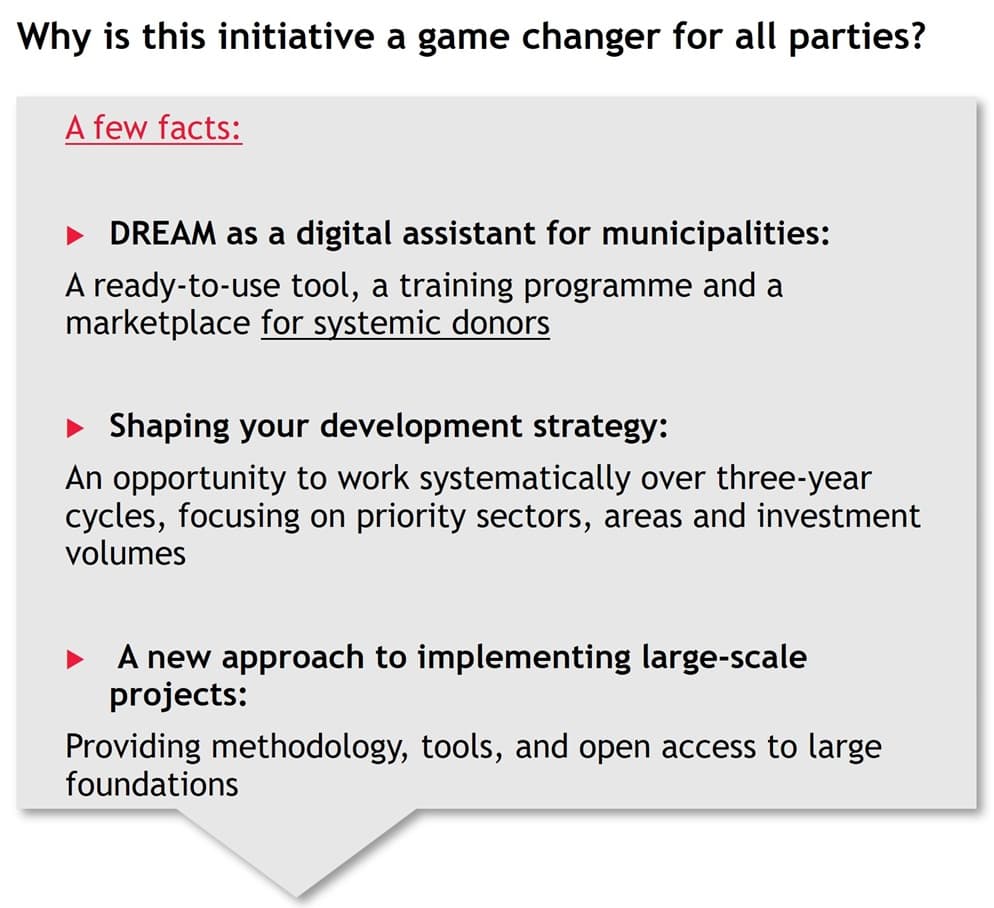BDO in Ukraine held an online webinar entitled “The Specifics of Creating Investment Projects for Municipalities.”
The event aimed to provide recommendations and share best practices on how Ukrainian municipalities can effectively design, prepare and manage investment projects, including participation in grant programmes and cooperation with international partners.The webinar brought together representatives of local governments, consultants and analysts from BDO in Ukraine. Andrii Borenkov, Dmytro Chubin, Tetiana Demchenko and Bohdan Galkin were among the speakers.
A well-prepared investment project is essential for sustainable municipality development
The webinar commenced with a presentation by investment analyst Dmytro Chubin, who presented the findings of the study “Capacity Analysis of Ukrainian Municipalities to Attract Grant Funding in 2024–2025.” The objective was to evaluate the level of preparedness, experience and challenges faced by Ukrainian municipalities that participate in investment and grant projects.According to Dmytro, the most active territorial units over the past two years were those with populations of up to 10,000 and 20,000 people. This year, the Chernihiv and Cherkasy regions entered the top five leaders, while the Odesa and Dnipropetrovsk regions demonstrated the highest dynamics of participation both in grant initiatives and surveys.
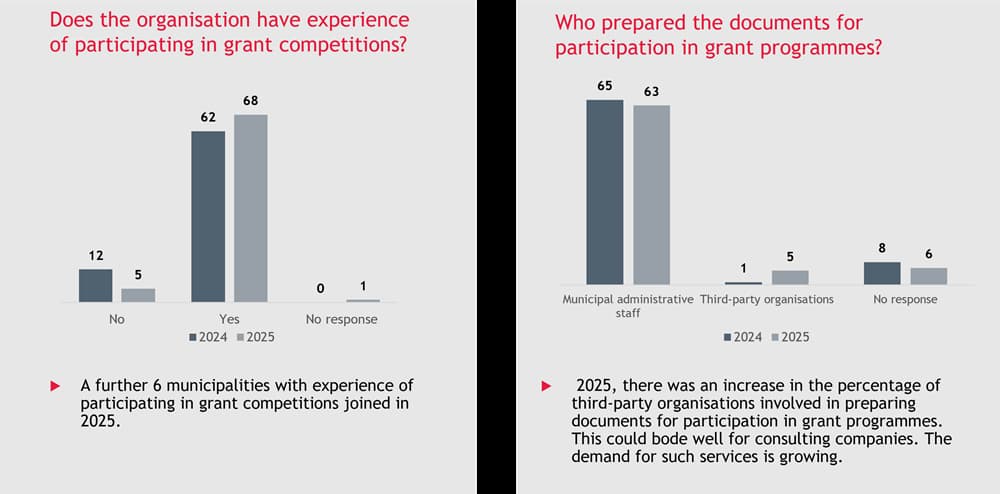
“The smaller the municipality, the stronger the communication with leadership. Conversely, the larger the municipality, the greater the experience with projects and grants,” emphasised Dmytro Chubin..
The speaker highlighted the following key trends:
- An increase in the number of language-related issues in local communities;
- A shortage of qualified personnel, particularly project managers and specialists in technical documentation;
- An increased activity in tender procedures;
- An expansion of management teams;
- A growing share of departmental specialists participating in research independently, instead of project managers.
In conclusion, Dmytro noted that over the past year, the number of territories participating in funding competitions and preparing the necessary documentation has increased, while interest in investment opportunities among local governments continues to grow steadily.
In his presentation, Andrii Borenkov, Head of Advisory, outlined the key factors for creating a successful investment project and analysed the pros and cons of this process.
From a professional standpoint, Andrii emphasised that a project aiming to secure financing must meet several key criteria. First and foremost, it is a strong team that demonstrates professionalism, unity and the ability to implement its plans. An effective business model is equally important. It details how the project will create value and generate profit.
Investors also pay close attention to financial soundness — the availability of realistic calculations, forecasts and sources of financing. Confirmation of demand, or market validation, indicates that the product or service already has interest from potential customers.
Another crucial factor in attracting financing is institutional readiness: the ability of an organisation to manage resources, processes and risks effectively. Furthermore, a project’s alignment with the strategic priorities of the state or major donors increases its likelihood of receiving support.
Ultimately, transparency and effective communication are essential for building trust among all those involved in the process, from investors to end beneficiaries.
Andrii Borenkov also mentioned that in 2024–2025, BDO in Ukraine participated in a pro bono project with the Ministry of Economy of Ukraine to prepare an investment guide for recovery conferences in Berlin and Rome. The team of BDO in Ukraine was responsible for the TMT sector — analytics, trends and investment profiles of companies. During the course of our work, we encountered a number of challenges relating to data quality, the absence of open information and rapid market changes.
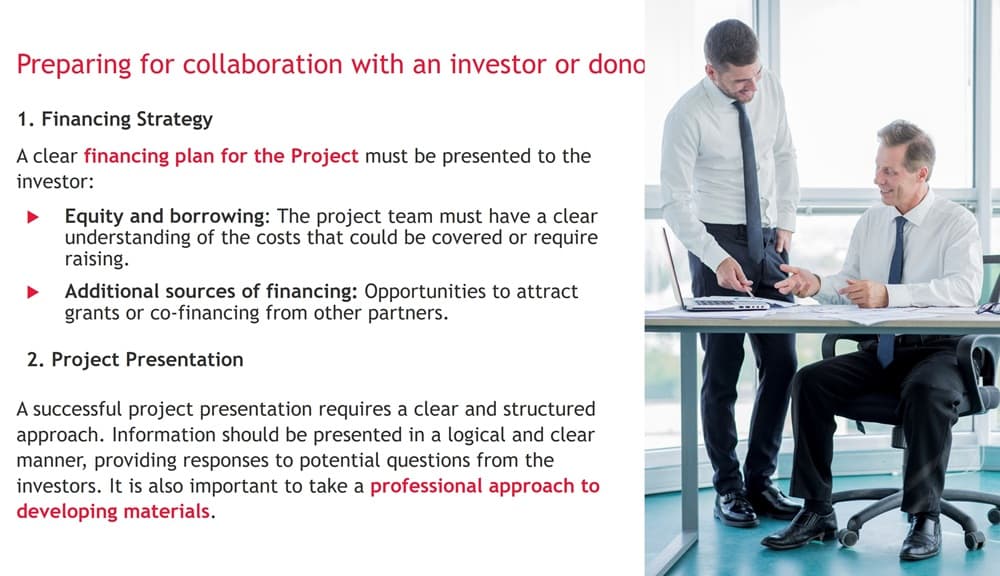
“It is advisable to approach any donor with at least partial understanding of where the financing will come from,” summarised Andrii Borenkov.
Tetiana Demchenko, Project Manager, introduced various AI tools (including Copilot analytics) , which help to prepare strong project proposals. She also offered practical advice on managing investment projects and sustaining communication with international donors.
Options for submitting an application
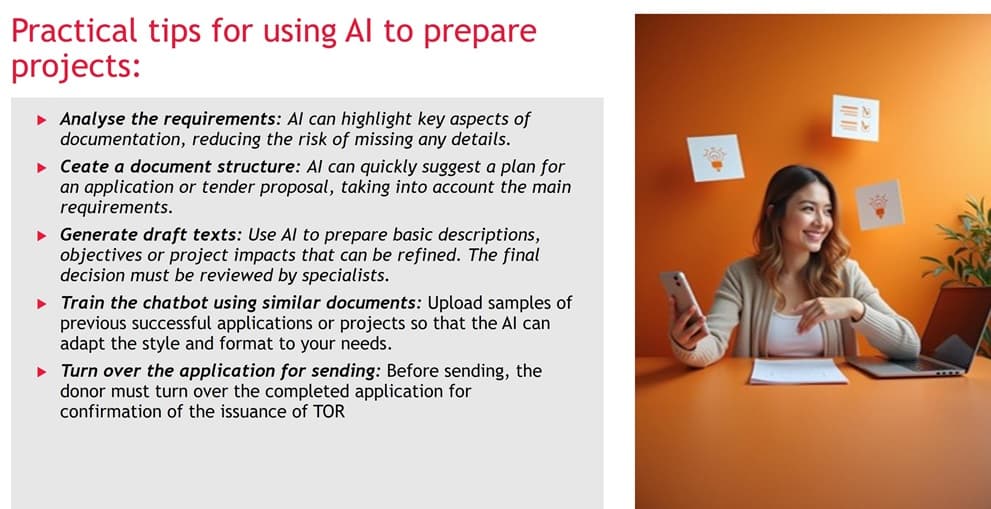
“Artificial intelligence is not just a trend — it is your efficiency,” emphasised Tetiana.
AI can assist in formulating SMART goals, which are clear, measurable and achievable, for every initiative of a municipality. Based on these goals, it is easy to identify the specific tasks that will contribute to the implementation of the project. It is also important to consider the risks in advance and inform those responsible about the results upon completion.
Copilot — a tool for perfect text. Tetiana demonstrated how Copilot enhances textual content, including press releases for municipal websites and social media posts. This enables information to be swiftly tailored for different audiences.
For translations, Tetiana Demchenko recommended DeepL (high accuracy, formatting preservation, speed, confidentiality, and the ability to convert files into different formats.) She emphasised the convenience of using DeepL.
The final speaker was Bohdan Galkin, Strategic Planning Manager, who delivered a presentation entitled “Practical Advice on Project Management and Communications.” The presentation aimed to summarise practical experience in managing projects with international partners, analyse the specifics of implementing public–private partnerships (PPPs) and identify key problems and prospects for reforming Ukraine’s public investment management system.
Legislative constraints in public–private partnerships
Bohdan Galkin has noted that the current regulatory framework in PPP is excessively regulated, creating significant barriers at the stage of project preparation and approval. The majority of issues are attributable to ineffective approval procedures, the absence of practical mechanisms for implementing methodologies, and outdated approaches to calculating economic indicators.At the same time, participants expressed their hope that the updated legislation currently being developed will bring greater transparency and facilitate the process of cooperation between the public and private sectors.
The speaker emphasised the following: “Communication must be executed with precision, mental characteristics must be comprehended, and we must provide not only a document but also context. In this manner, we initiate the management of the process and underscore the pivotal features for successful project implementation.”
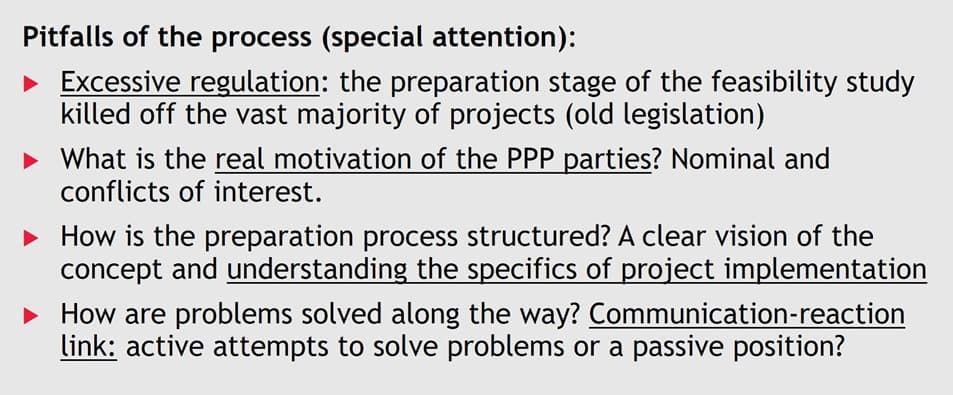
The speaker emphasised the use of the DREAM platform, a digital assistant for municipalities that combines a tool, a learning platform and a marketplace for systemic donors. DREAM assists municipalities in developing their own development strategies on a three-year cycle, identifying priority sectors, areas, and investment volumes. Thanks to its new approach to implementing large projects, DREAM offers municipalities not only effective tools and methodology, but also open access to funds, creating the conditions for their systematic, transparent and sustainable development.
- Strengthen the analytical preparation of projects, taking into account the institutional and mental characteristics of international partners.
- Ensure regular communication between all participants in the process at all stages of the project life cycle.
- Initiate preliminary screening of potential partners regarding their real motivation and absence of conflicts of interest.
- Implement internal project management standards that are consistent with international practices (PMI, PRINCE2).
- Support participation in the formation of new legislative initiatives aimed at simplifying PPP procedures.
As a result, webinar participants gained detailed insight into the following aspects of municipalities and investments:
- Tools and methods (including artificial intelligence) that can help prepare strong project proposals.
- Features of developing investment projects for municipalities.
- Practical advice on managing investment projects and maintaining communication with international donors.
- Results of a survey on the readiness of Ukrainian municipalities to participate in investment and grant activities.
- Support for local governments to improve their project management capacity and increase the effectiveness of attracting external financing.
The full version of the webinar is available at the following link.
Municipalities occupy a special place in socio-economic life. The team of BDO in Ukraine is doing everything it can to help municipalities develop.
We offer expert solutions in the field of digital transformation, business process automation, assistance for municipalities in implementation of sustainable development, and advice on taxation and investment.
Should you require further consultation, please contact our specialists.
